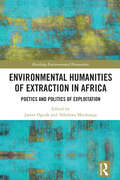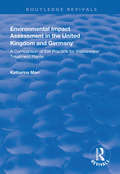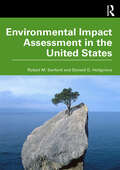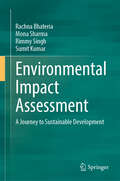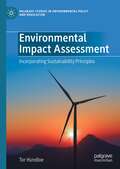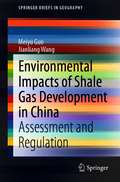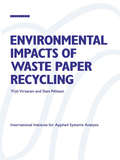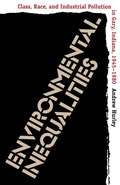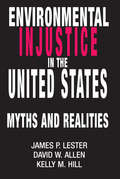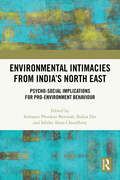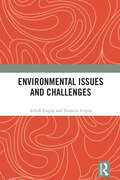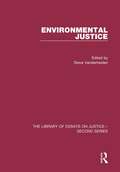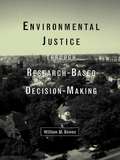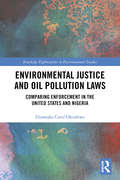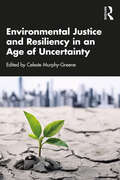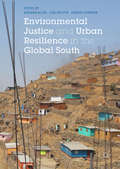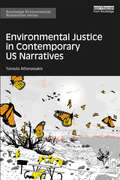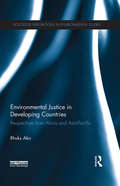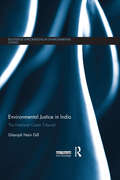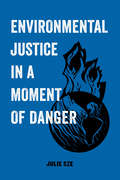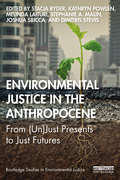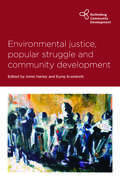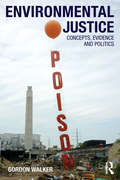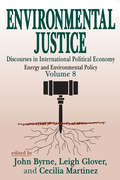- Table View
- List View
Environmental Humanities of Extraction in Africa: Poetics and Politics of Exploitation (Routledge Environmental Humanities)
by James Ogude Tafadzwa MushongaThis book brings together perspectives on resource exploitation to expose the continued environmental and socio-political concerns in post-colonial Africa. The continent is host to a myriad of environmental issues, largely resulting from its rich diversity of natural resources that have been historically subjected to exploitation. Colonial patterns of resource use and capital accumulation continue unabated, making environmental and related socio-political problems a dominant feature of African economies. The book pursues the manifestation of these problems through four themes: environmental justice, violent capitalocenes, indigenous knowledge, and climate change. The editors locate the book within the broad fields of political ecology and environmental geopolitics to highlight the intricate geographies of resource exploitation across Africa. It uniquely focuses on the socio-political and geopolitical dynamics associated with the exploitation of Africa’s natural resources and its people. The case studies from different parts of Africa tell a compelling story of resource exploitation, related issues of environmental degradation in a continent particularly vulnerable to climate change, and the continued plundering of its natural resources. The book will be of great interest to scholars and students from the interdisciplinary fields of the environmental humanities and environmental studies more broadly, as well as those studying political ecology, environmental policy, and natural resources with a specific focus on Africa.
Environmental Impact Assessment in the United Kingdom and Germany: Comparision of EIA Practice for Wastewater Treatment Plants (Routledge Revivals)
by Katharina MarrFirst published in 1997, this volume examines wastewater treatment plants in the UK and their counterparts in Germany in the wake of the International Study of the Effectiveness of Environmental Assessment (1996). Having originated in the United States National Environment Policy Act of 1969, the basic concept of EIAs has been adopted around the world and are highly diverse today. This study aims to examine, compare and suggest improvements for EIA practices as applied to wastewater treatment in the UK and Germany.
Environmental Impact Assessment in the United States
by Donald G. Holtgrieve Robert M. SanfordEnvironmental impact assessment is now firmly established as an important and often mandatory part of proposing any development project. Environmental Impact Assessment in the United States provides foundational knowledge of environmental review in the United States as carried out at federal, state, and local levels, with detailed information about the National Environmental Policy Act (NEPA) and its applications, and other relevant federal and state legislation. This book will aid planners, architects, engineers, project managers, or consultants who work with environmental impact statements to assess the effects of a proposed activity on the environment and who develop and assess measures to avoid or minimize those impacts. It will serve as a desk reference for professional environmental planners as well as a core textbook for students who intend to work in the fields of environmental policy, civil engineering, environmental law, resources management, or other areas of environmental management.
Environmental Impact Assessment: A Journey to Sustainable Development
by Mona Sharma Sumit Kumar Rachna Bhateria Rimmy SinghThis book will cover the basic principles and salient features of EIA. The authors attempt to cover the shortcomings observed in EIA reports, the manner of conducting EIA for proposed projects, and also to facilitate the preparation of good quality EIA reports. The book is written in a straightforward format avoiding long descriptive texts to enhance the reader experience Although the focus is on the Indian context, the concepts and techniques of EIA described in this book are applicable universally. An Environmental Management Plan (EMP) is also discussed, and this is an essential aspect of EIA in countries where priority is on economic development by way of development projects and when the EIA process has inherent weaknesses. For the continual improvement of EIA reports, EIA consultants maybe assigned the task of implementing and operationalizing the suggested EMP in addition to conducting an EIA study and in preparation of an EIA report. The system of peer review of EIA reports is also expected to improve EIA quality. “Environmental Impact Assessment: A Journey to Sustainable Development” is an attempt to cover EIA according to new knowledge acquired through research and experiences which will make this tool more versatile and dynamic. The authors recognise that since EIA is continuously expanding and developing there will always be potential for improving the scope of this book to make it more useful to the users as per their requirement. This book will be of interest to academics, EIA professionals and consultants, EIA review/appraisal authorities and particularly stakeholders in emerging economies where major developmental work is being undertaken and which is expected to continue in decades to come.
Environmental Impact Assessment: Incorporating Sustainability Principles (Palgrave Studies in Environmental Policy and Regulation)
by Tor HundloeThis book provides a detailed treatment of the ecological, economic and social impacts in the context of environmental impact assessment (EIA) and makes clear the necessary link between EIA and the sustainability principles of protecting biodiversity, risk aversion, and inter and intra-generational equity. It proposes that the benefits and costs of a project need to be weighted according to who bears them, giving particular attention to the planet’s poor. Furthermore, this book presents a comprehensive analysis of environmental offsetting which has come to be commonly resorted to when negative impacts cannot be mitigated. In this context, the book argues that offsetting is only viable if advanced offsets are quarantined through a Strategic Environmental Impact approach. Finally, the book explores the role of the various disciplines which need to be mastered in undertaking an EIA.This book takes you on a journey from the beginning of environmental impact assessment to the present day. It is a scholarly warts and all study. For each trial and tribulation, Hundloe presents a remedy. It is essential reading and an invaluable reference for environmental practitioners, politicians, policy makers, academics and, the most important group, future environmental practitioners.
Environmental Impacts of Shale Gas Development in China: Assessment and Regulation (SpringerBriefs in Geography)
by Jianliang Wang Meiyu GuoThis book features a comprehensive analysis of the development of shale gas resources in China, with a focus on the potential environmental impacts that may result. China has the world’s largest shale gas resources, which it is keen to develop to alleviate air pollution and successfully transition to a low-carbon energy future. However, one significant obstacle standing between the ambition and reality is the potentially serious environmental impacts of shale gas production. This book offers a systematic assessment of these potential impacts, including the risk of water contamination, ecological disruption due to the huge consumption of water and methane leakage. It presents valuable first-hand data collected from the authors’ fieldwork in Sichuan and Chongqing and the latest information on China’s current shale gas operations and also includes a set of models and methods developed to quantify the impacts. It allows readers to gain a deeper understanding of environmental regulatory management systems regarding shale gas production in China by examining whether the existing monitoring, reporting and verification (MRV) systems and environmental regulations can effectively prevent adverse impacts from shale gas production. Providing a detailed study of shale gas development in China based on an unprecedented primary dataset, the book is a valuable resource for scholars, engineers and students who are interested in the energy development and environmental risks.
Environmental Impacts of Waste Paper Recycling
by Sten Nilsson Yrjo VirtanenPublic concern for the conservation of natural resources and a general awareness of the environmental consequences of waste disposal is reflected in current legislation aimed at reducing waste. Recycling is commonly cited as one of the preferred methods of waste reduction and this book summarizes a recent study of paper recycling in Europe, which investigated the entire production and disposal process using a life-cycle methodology. The results of the study underline the economic and environmental advantages of paper recycling, but more controversially, they also show how, under certain conditions, the renewable character and the high energy content of paper seem to make energy recovery more attractive than recycling.
Environmental Inequalities
by Andrew HurleyBy examining environmental change through the lens of conflicting social agendas, Andrew Hurley uncovers the historical roots of environmental inequality in contemporary urban America. Hurley's study focuses on the steel mill community of Gary, Indiana, a city that was sacrificed, like a thousand other American places, to industrial priorities in the decades following World War II. Although this period witnessed the emergence of a powerful environmental crusade and a resilient quest for equality and social justice among blue-collar workers and African Americans, such efforts often conflicted with the needs of industry. To secure their own interests, manufacturers and affluent white suburbanites exploited divisions of race and class, and the poor frequently found themselves trapped in deteriorating neighborhoods and exposed to dangerous levels of industrial pollution. In telling the story of Gary, Hurley reveals liberal capitalism's difficulties in reconciling concerns about social justice and quality of life with the imperatives of economic growth. He also shows that the power to mold the urban landscape was intertwined with the ability to govern social relations.
Environmental Injustice In The U.S.: Myths And Realities
by James LesterEnvironmental Injustice in the United States provides systematic insight into the social, economic, and political dynamics of environmental decision-making, and the impacts of those decisions on minority communities. The first part of the book examines closely the history of the environmental justice movement and the scholarly literature to date, with a discussion about how the issue made the public agenda in the first place. The second part of the book is a unique quantitative analysis of the relationship among race, class, political mobilization, and environmental harm at three levels-- state, county, and city. Despite the initial skepticism of the authors, their study finds both race and class to be significant variables in explaining patterns of environmental harm. The third part of the book then offers policy recommendations to decisionmakers, based on the book's findings. It was named a Choice Outstanding Academic Book of 2001.
Environmental Intimacies from India’s North East: Psycho-Social Implications for Pro-Environment Behaviour
by Indranee Phookan Borooah Sabiha Alam Choudhury Bidita DasThis book explores the intimate relationship of the people of North East India with the environment as evinced from their traditional beliefs, cultural practices, and livelihood. It offers insights into the challenges and adaptability of communities through actions ensuring conservation of the environment yet sustaining their livelihood.The book encompasses movement toward responsible actions and the engagement of communities in pro-environmental behavior. It showcases the various practices, knowledge, and debates on the environment-behavior relationship of the people of North East India. It brings into focus some of the daunting environmental issues and the endeavors for sustenance that is true to a region which is rich in ecological diversity and touches the spirit and psyche of its people.This volume will be of interest to scholars and researchers of psychology, anthropology, sociology, environmental sciences, development studies, law and governance, environmental administration, and South Asia studies.
Environmental Issues and Challenges
by Abhik Gupta Susmita GuptaThis book explores the field of environmental studies emphasizing its multidisciplinary nature. It looks at the fundamentals of environmental conservation and the management of sensitive ecosystems. The book provides an overview of the basic concepts used to understand and study diverse ecosystems and their functions as well as the progressively larger yet mutually inclusive units, such as the landscape and the biome. It examines the challenges towards preserving biodiversity which is under severe threat due to climate change, exploitation of natural resources, pollution, and man-made disasters. Besides outlining the causes and effects, the authors outline control mechanisms to keep pollution within safe limits and offer suggestions for resolving issues such as wildlife poaching and trade, water and air pollution, deforestation, and biodiversity loss through policy changes. This book will be of interest to the students, researchers, teachers of environmental studies, environmental science, sociology, political science, and public administration. This book will also be useful to environmentalists, wildlife conservationists, and policy makers.
Environmental Issues and Challenges
by Abhik Gupta Susmita GuptaThis book explores the field of environmental studies emphasizing its multidisciplinary nature. It looks at the fundamentals of environmental conservation and the management of sensitive ecosystems.The book provides an overview of the basic concepts used to understand and study diverse ecosystems and their functions as well as the progressively larger yet mutually inclusive units, such as the landscape and the biome. It examines the challenges towards preserving biodiversity which is under severe threat due to climate change, exploitation of natural resources, pollution, and man-made disasters. Besides outlining the causes and effects, the authors outline control mechanisms to keep pollution within safe limits and offer suggestions for resolving issues such as wildlife poaching and trade, water and air pollution, deforestation, and biodiversity loss through policy changes.This book will be of interest to the students, researchers, teachers of environmental studies, environmental science, sociology, political science, and public administration. This book will also be useful to environmentalists, wildlife conservationists, and policy makers.
Environmental Justice (The Library of Essays on Justice - Second Series)
by Steve VanderheidenThis collection of scholarly articles takes as its subject matter discourses on environmental justice. The concept emerged in recent decades as an important framing concept for a wide variety of environmental movements and objectives, and has gained considerable currency due to the scope and normative force that its principles contain, whether in legal, political, or philosophical applications. This collection is an invaluable resource for researchers and scholars in this field given that the multiple theories and analyses of environmental justice are likely to remain central to the ongoing development of normative theorizing about the human role in the environment in the foreseeable future.
Environmental Justice Through Research-Based Decision-Making (Routledge Research in Public Administration and Public Policy)
by William M. BowenThis book discusses whether and to what extent there are widespread injustices and inequities caused by the distribution of environmental hazards in America today.
Environmental Justice and Oil Pollution Laws: Comparing Enforcement in the United States and Nigeria (Routledge Explorations in Environmental Studies)
by Eloamaka Carol OkonkwoThis book explores the relationship between oil pollution laws and environmental justice by comparing and contrasting the United States and Nigeria. Critically, this book not only examines the fluidity of oil pollutions laws but also how effective or ineffective enforcement can be when viewed through the lens of environmental justice. Using Nigeria as a case study and drawing upon examples from the United States, it examines the legal and institutional challenges impacting upon the effective enforcement of laws and provides a contrasting view of developed and developing countries. Focusing on the oil and gas industry, the book discusses the laws and international acceptable standards (IAS) in these industries, the principles behind their application, the existing barriers to their effective implementation, and how to overcome those barriers. Utilising an environmental justice framework, the book demonstrates the synergy between policy-making, human rights, and justice in oil-producing regions as well as addressing the importance of protecting the rights of minorities. Through a comparative analysis of the United States and Nigeria, this book draws out enforcement approaches and mechanisms for tackling oil-related pollution with a view to reducing environmental injustice in developing countries. Examining the role of NGOs in pursuing environmental justice matters, the book showed the regional courts as one avenue of overcoming the enforcement challenges faced by the developing countries. This book will be of great interest to students and scholars of environmental law, environmental justice, minorities' rights, business and human rights, energy law, and natural resource governance.
Environmental Justice and Resiliency in an Age of Uncertainty
by Celeste Murphy-GreeneThis book examines the issue of environmental justice across 11short chapters, with the aim of creating a resilient society. Starting with a history of the environmental justice movement, the book then moves on to focus on various current environmental issues, analyzing how these issues impact low-income and minority communities. Topics covered include smart cities and environmental justice, climate change and health equity, the Flint Water Crisis, coastal resilience, emergency management, energy justice, procurement and contract management, public works projects, and the impact of COVID-19. Each chapter provides a unique perspective on the issues covered, offering practical strategies to create a more resilient society that can be applied by practitioners in the field. Environmental Justice and Resiliency in an Age of Uncertainty will be of interest to upper level undergraduate and graduate students studying race relations, environmental politics and policy, sustainability, and social justice. It will also appeal to practitioners working at all levels of government, and anyone with an interest in environmental issues, racial justice, and the construction of resilient communities.
Environmental Justice and Urban Resilience in the Global South
by Adriana Allen Liza Griffin Cassidy JohnsonThis edited volume provides a fresh perspective on the important yet often neglected relationship between environmental justice and urban resilience. Many scholars have argued that resilient cities are more just cities. But what if the process of increasing the resilience of the city as a whole happens at the expense of the rights of certain groups? If urban resilience focuses on the degree to which cities are able to reorganise in creative ways and adapt to shocks, do pervasive inequalities in access to environmental services have an effect on this ability? This book brings together an interdisciplinary and intergeneration group of scholars to examine the contradictions and tensions that develop as they play out in cities of the Global South through a series of empirically grounded case studies spanning cities of Asia, Latin America, Africa and Eastern Europe.
Environmental Justice in Contemporary US Narratives: Environmental justice in contemporary U.S. narratives (Routledge Environmental Humanities)
by Yanoula AthanassakisEnvironmental Justice in Contemporary US Narratives examines post-1929 US artistic interrogations of environmental disruption. Tracing themes of pollution, marine life, and agricultural production in the work of a number of historically significant writers including John Steinbeck, Ruth Ozeki, and Cherríe Moraga, this book outlines a series of incisive dialogues on transnational flows of capital and environmental justice. Texts ranging from The Grapes of Wrath (1939) to Body Toxic (2001) represent the body as vulnerable to a host of environmental risks. They identify "natural disasters" not just as environmental hazards and catastrophes, but also as events intertwined with socioeconomic issues. With careful textual analysis, Athanassakis shows how twentieth- and twenty-first-century US writers have sought to rethink traditional understandings of how the human being relates to ecological phenomena. Their work, and this study, offer new modes of creative engagement with environmental degradation – engagement that is proactive, ambivalent, and even playful. This book contributes to vital discussions about the importance of literature for social justice movements, food studies, ecocriticism, and the environmental humanities. The core argument of the book is that artistically imaginative narratives of environmental disturbance can help humans contend with ostensibly uncontrollable, drastic planetary changes.
Environmental Justice in Developing Countries: Perspectives from Africa and Asia-Pacific (Routledge Explorations in Environmental Studies)
by Rhuks AkoThe evolving environmental justice paradigm is conceptualized differently based on political, economic and historical factors. In developed countries, emphasis is placed on the role of individuals in environmental decision-making and the protection of their access to the prerequisite environmental information and capacity to challenge environmental decisions is the main focus. However, in developing countries, access to land and natural resources are considered integral elements of environmental justice paradigm. This book focuses on the conceptualization, recognition and protection of environmental justice in developing countries. It explores the situation by engaging an analytical discourse of relevant legal provisions in four case study countries including Nigeria, South Africa, India and Papua New Guinea. The comparative analysis of environmental justice in these countries present a framework within which to appreciate the conceptualization of the environmental justice paradigm
Environmental Justice in India: The National Green Tribunal (Routledge Explorations in Environmental Studies)
by Gitanjali Nain GillModern environmental regulation and its complex intersection with international law has led many jurisdictions to develop environmental courts or tribunals. Strikingly, the list of jurisdictions that have chosen to do this include numerous developing countries, including Bangladesh, Kenya and Malawi. Indeed, it seems that developing nations have taken the task of capacity-building in environmental law more seriously than many developed nations. Environmental Justice in India explores the genesis, operation and effectiveness of the Indian National Green Tribunal (NGT). The book has four key objectives. First, to examine the importance of access to justice in environmental matters promoting sustainability and good governance Second, to provide an analytical and critical account of the judicial structures that offer access to environmental justice in India. Third, to analyse the establishment, working practice and effectiveness of the NGT in advancing a distinctively Indian green jurisprudence. Finally, to present and review the success and external challenges faced and overcome by the NGT resulting in growing usage and public respect for the NGT’s commitment to environmental protection and the welfare of the most affected people. Providing an informative analysis of a growing judicial development in India, this book will be of great interest to students and scholars of environmental justice, environmental law, development studies and sustainable development.
Environmental Justice in a Moment of Danger (American Studies Now: Critical Histories of the Present #11)
by Julie Sze“Let this book immerse you in the many worlds of environmental justice.”—Naomi Klein We are living in a precarious environmental and political moment. In the United States and in the world, environmental injustices have manifested across racial and class divides in devastatingly disproportionate ways. What does this moment of danger mean for the environment and for justice? What can we learn from environmental justice struggles? Environmental Justice in a Moment of Danger examines mobilizations and movements, from protests at Standing Rock to activism in Puerto Rico in the wake of Hurricane Maria. Environmental justice movements fight, survive, love, and create in the face of violence that challenges the conditions of life itself. Exploring dispossession, deregulation, privatization, and inequality, this book is the essential primer on environmental justice, packed with cautiously hopeful stories for the future.
Environmental Justice in the Anthropocene: From (Un)Just Presents to Just Futures (Routledge Studies in Environmental Justice)
by Stacia Ryder, Kathryn Powlen, Melinda Laituri, Stephanie A. Malin, Joshua Sbicca, and Dimitris StevisThrough various international case studies presented by both practitioners and scholars, Environmental Justice in the Anthropocene explores how an environmental justice approach is necessary for reflections on inequality in the Anthropocene and for forging societal transitions toward a more just and sustainable future. Environmental justice is a central component of sustainability politics during the Anthropocene – the current geological age in which human activity is the dominant influence on climate and the environment. Every aspect of sustainability politics requires a close analysis of equity implications, including problematizing the notion that humans as a collective are equally responsible for ushering in this new epoch. Environmental justice provides us with the tools to critically investigate the drivers and characteristics of this era and the debates over the inequitable outcomes of the Anthropocene for historically marginalized peoples. The contributors to this volume focus on a critical approach to power and issues of environmental injustice across time, space, and context, drawing from twelve national contexts: Austria, Bangladesh, Chile, China, India, Nicaragua, Hungary, Mexico, Brazil, Sweden, Tanzania, and the United States. Beyond highlighting injustices, the volume highlights forward-facing efforts at building just transitions, with a goal of identifying practical steps to connect theory and movement and envision an environmentally and ecologically just future. This interdisciplinary work will be of great interest to students, scholars, and practitioners focused on conservation, environmental politics and governance, environmental and earth sciences, environmental sociology, environment and planning, environmental justice, and global sustainability and governance. It will also be of interest to social and environmental justice advocates and activists.
Environmental Justice, Popular Struggle and Community Devt (Rethinking Community Development)
by Anne Harley Eurig ScandrettStruggles for environmental justice involve communities mobilising against powerful forces which advocate ‘development’, driven increasingly by neoliberal imperatives. In doing so, communities face questions about their alliances with other groups, working with outsiders and issues of class, race, ethnicity, gender, worker/community and settler/indigenous relationships. Written by a wide range of international scholars and activists, contributors explore these dynamics and the opportunities for agency and solidarity. They critique the practice of community development professionals, academics, trade union organisers, social movements and activists and inform those engaged in the pursuit of justice as community, development and environment interact.
Environmental Justice: Concepts, Evidence and Politics (Antipode Book Ser. #26)
by Gordon WalkerEnvironmental justice has increasingly become part of the language of environmental activism, political debate, academic research and policy making around the world. It raises questions about how the environment impacts on different people’s lives. Does pollution follow the poor? Are some communities far more vulnerable to the impacts of flooding or climate change than others? Are the benefits of access to green space for all, or only for some? Do powerful voices dominate environmental decisions to the exclusion of others? This book focuses on such questions and the complexities involved in answering them. It explores the diversity of ways in which environment and social difference are intertwined and how the justice of their interrelationship matters. It has a distinctive international perspective, tracing how the discourse of environmental justice has moved around the world and across scales to include global concerns, and examining research, activism and policy development in the US, the UK, South Africa and other countries. The widening scope and diversity of what has been positioned within an environmental justice ‘frame’ is also reflected in chapters that focus on waste, air quality, flooding, urban greenspace and climate change. In each case, the basis for evidence of inequalities in impacts, vulnerabilities and responsibilities is examined, asking questions about the knowledge that is produced, the assumptions involved and the concepts of justice that are being deployed in both academic and political contexts. Environmental Justice offers a wide ranging analysis of this rapidly evolving field, with compelling examples of the processes involved in producing inequalities and the challenges faced in advancing the interests of the disadvantaged. It provides a critical framework for understanding environmental justice in various spatial and political contexts, and will be of interest to those studying Environmental Studies, Geography, Politics and Sociology.
Environmental Justice: International Discourses in Political Economy
by Paul ThompsonEnvironmental justice is one of the most controversial and important issues in contemporary social science. Volume 8 of the Energy and Environmental Policy series challenges our understanding of environmental justice in a global context. It includes theoretical investigations and case studies by leading authors in the field.Global forces of technology and the development of global markets are transforming social life and the natural order. These changes require a critical examination of nature-society relations. Increasingly, modernization assigns the risks of modernity to those with the least power and greatest vulnerability to environmental harm. Conventional environmentalism, which focuses on critique of the effects of humanity against nature, is inadequate to the challenges of globalization. In particular, it fails to explain sources of persistent patterns of social injustice that accompany escalating environmental exploitation. As the capacity for environmental destruction expands, broader concerns about environmental injustice have come to the fore, including awareness of threats to whole cultures, ways of life, and entire ecologies. The volume's authors consider the links between expanded patterns of environmental injustice and the structures and forces underlying and shaping the international political economy.Environmental injustice is examined across a variety of cultures in the developed and developing world. Through case studies of climate colonialism, revolutionary ecology, and environmental commodification, the global and local dimensions of the problem are presented.The latest volume in this important series demonstrates that environmental justice cannot be reduced to simple parables of indifference, prejudice, or appropriation. It forges understanding of environmental injustice as a development of international political economy itself. Likewise, initiatives on behalf of environmental justice are seen as elements of broader movements to secure self-determination in a globalizing world. This book will be of interest to policymakers, energy and environmental experts, and all those interested in the environment and environmental law. It provides new perspectives on the place of environmental justice in international political and economic conflict.
